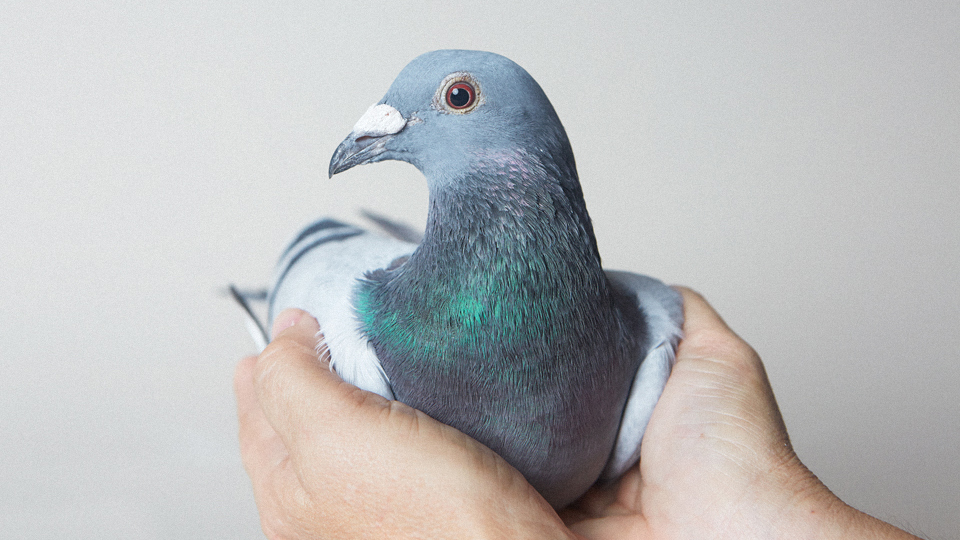What do I do if I think a pigeon or dove needs my help?
Read on below to learn when a pigeon may need your help, and how to hold, house and care for your pigeon until you can bring it to a pigeon or dove friendly rescue.
Information below has been reposted with permission from Palomacy. Please visit them for more information and to make a life-saving donation to help heal and save pigeons in need.
How to tell if a pigeon needs your help
Please visit pigeonrescue.org to learn more.
A young banded pigeon.
It is hanging around persistently and seems to be asking for help. If so, it’s probably a domestic — or injured — bird that needs capture and care.
It cannot fly. A pigeon without flight cannot survive in the wild. It should be caught and cared for. (See instructions below.)
It is a baby or is injured. Whether domestic or wild, baby pigeons and injured pigeons need proper medical care ASAP. If the bird is too young to self-feed, or is gasping, shaking (seizures, tremors), bleeding or vomiting, take it to an avian veterinarian immediately. Urgent care info here.
It is a domesticated fancy or king pigeon. King Pigeons are large domestic pigeons — usually pure white or mostly white — that cannot fly well or fend for themselves in the wild. They face certain death if not rescued.
A pigeon may also need your help if it has a numbered band. Banded pigeons are often registered racing or homing pigeons, but they can also be pets. A healthy, banded homing pigeon may have successfully joined a wild flock. But if the banded pigeon does not seem to be well or thriving, you may want to capture the bird.
How to (gently!) capture a lost or injured pigeon
Please visit pigeonrescue.org to learn more.
A pigeon being held gently and securely.
As a general rule, you do not have to be afraid of handling pigeons. Contracting an animal-to-human disease is rare.
1. If possible, have a box or pet carrier ready, lined with a soft cloth or paper towels. If you are in a situation where carrying a box is not possible, you can temporarily transport a pigeon safely in a paper grocery bag folder over or clipped at the top.
2. Capture the pigeon using one of the following strategies:
If the pigeon is badly injured or very tame, you may be able to pick it up. Always handle the bird gently, grabbing it across the back and both wings, with both hands. See how to hold a pigeon here.
If you can’t easily pick up the pigeon, but you can get close, you may be able to throw a towel or jacket over the bird to restrain it before placing it in the box.
If you can’t get close, try using food to tempt or lure the pigeon into a carrier, crate, box, or a shed or garage in which it will be much easier to catch.
Another option is to walk behind it slowly and herd it through an open door inside where it can be more easily cornered and caught.
If you have trouble helping the pigeon, seek help at the Pigeon Talk website. Or contact your local animal shelter for assistance.
How to house your pigeon until you can reach a pigeon-friendly rescue
Please visit pigeonrescue.org to learn more.
A large dog crate makes a good pigeon cage indoors (but is not safe outside!)
Pigeons eat seeds and grains sold at feed stores as “pigeon feed”
Housing your pigeon
1. Pigeons do not perch like parrots do. Please provide a flat surface for your pigeon to stand on (not a wire-bottomed cage). For perching, a brick, sturdy flat rock, or raised platform are great options.
2. Pigeons drink water by submerging their beaks. Please provide a water source at least 1" deep, and provide fresh water daily.
3. Keep them calm, quiet, and clean. House your pigeon away from other pets, and away from noise, and drafts. They love a window to look through, and will appreciate a towel or blanket draped over part of their cage/enclosure so that they have somewhere to hide if they feel frightened.
Visit Palomacy's page on how to choose a cage for your pigeon for more information on longer-term housing.
Feeding your pigeon
Pigeons eat seeds and grains and you can buy pre-mixed blends called pigeon feed at feed stores but, until you can get that, you can feed them wild bird seed or dove & quail mix which are usually readily available at pet supply stores. See Palomacy's feed recommendations here. You may also feed your pigeon pellets such as Harrison's feed designed for birds.
Provide fresh food for your pigeon daily!
My pigeons eat Harrison's, and LOVE safflower seeds as a treat!
Supportive care for your pigeon
Traumatized or sick pigeons may benefit from having access to a heating pad placed in just part of their enclosure, so that they may choose to stand on it or not.
Pigeon & dove friendly rescues
Please visit pigeonrescue.org to learn more.
Not all rescues will help pigeons & doves (whether domestic or nonnative) but these will. This is just a partial list to get you started.
Please contact those closest
to you and ask for referrals to an even closer rescue if needed. Click on the map below or visit pigeon & dove friendly rescues on google maps for more information.
Peace, 2011. Photo by Erin Butner







